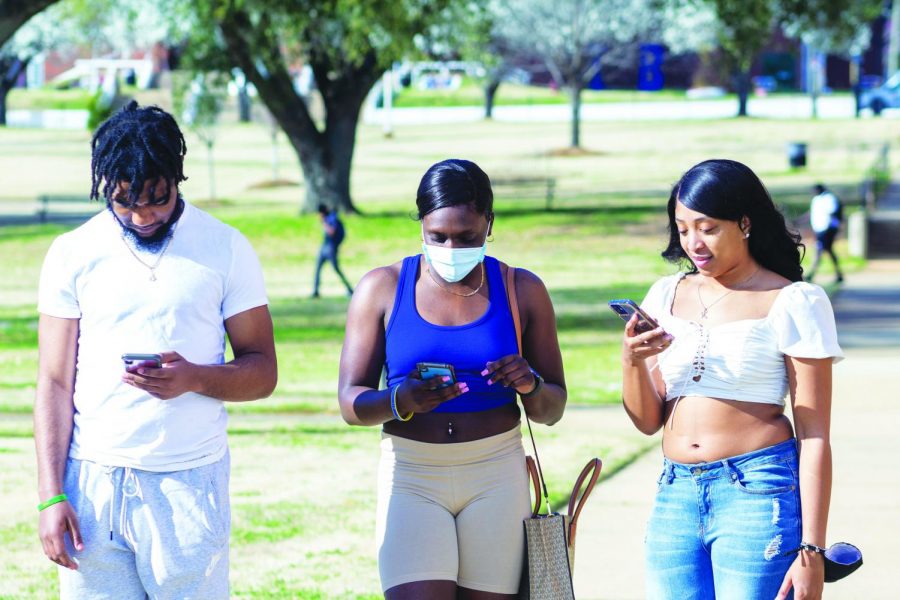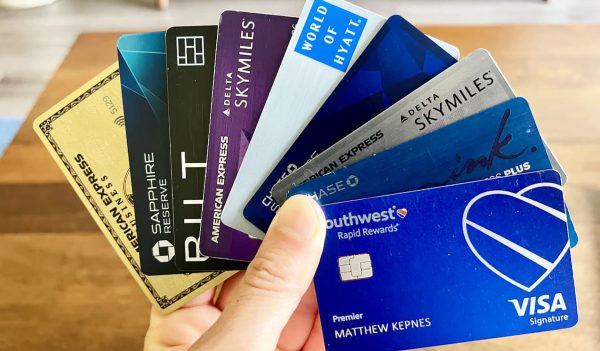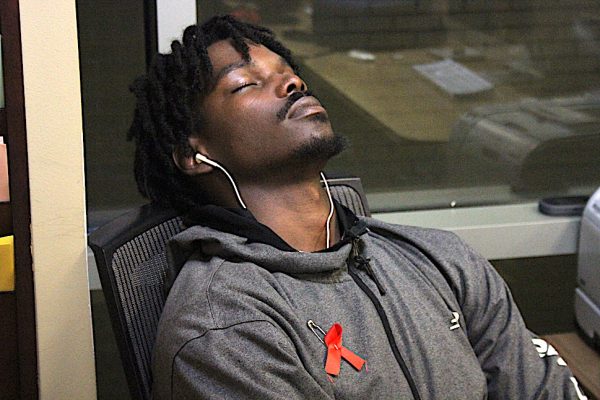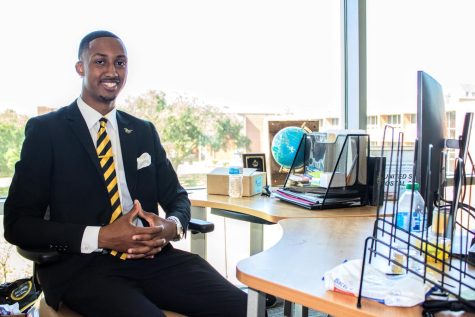Can an ASU student live without a cell phone?
March 25, 2021
Beginning in the 1970s, the Information Age took the world by storm with the introduction of the World Wide Web. Though the internet was first accessed exclusively decades later, it lies in the palm of every person’s hands via cell phones.
While cell phones were initially used for giving and receiving calls, they are now hubs of intelligence that allow us to cater to every aspect of our life. Considering many modern students grew up alongside the cell phone evolution, there is a strong connection, almost dependency, between the average young adult and their device.
“Without my phone, I am nothing,” simply states one ASU first-year who preferred to remain anonymous.
The first cell phone, the Motorola DynaTAC 8000x, was introduced to the world in 1983, and while it only offered mobile calling, it was priced at a whopping $4000. Text messaging was added as a feature in 1992 with Orbitel TPU 901, email in 1996 with the Nokia 9000, and in 2000 the camera was introduced with the Sharp J-SH04 model. These were the first major features that would soon control most aspects of our lives. Over the past two decades, the attributes of internet streaming, mp3 and mp4 services, file storage, fitness tracking, sleep monitors, alarms, notes, reminders, and the work of countless other apps have been added to our cellphones.
“It is everything. There is nothing that I do without my phone,” shares Camryn Rogers, a sophomore forensic biology major.
Tyrone Thrasher, a graduate student, is pursuing a master’s degree in rehabilitation counseling advocates for more constructive cellphone use. “I do everything on my phone,” he says. “I monitor stocks, check up on social media, I get quicker news on the phone than from my television. I can do research and a lot more.”
Though the many uses have become overwhelming for older citizens, Generation Z has learned to master their devices to add order and harmony to their daily lives. Amaya Williams, a sophomore communications major, is appreciative of all that her phone does.
“My cellphone plays a major role just because it has everything. It has my alarm, my reminders, it’s the way a lot of my class work gets done,” she explains. She shares that without her phone, she would be cut off socially from the people in her life, especially since she only remembers one of her contacts’ phone numbers. “Overall [cellphones] are pretty positive. It lets me interact with people all over the world, or even just at school it helps to meet new people.”
With the emergence of the global COVID pandemic, and many proceedings being held virtually, the cellphone’s role has escalated. Students have been forced to attend classes, meetings, and much more virtually. They find it highly convenient to have their lectures and assignments at their fingertips.
Kayla Tillman, a senior in the biomedical engineering program, shares that her phone’s primary use is for school purposes.
She says, “With school and everything being virtual, [cellphones] are very important. It is a lot easier to access class, research, and share things.” Unlike many of her classmates, she refuses to make her phone the center of her life. When not doing work, she prefers to take time away from the six-by-three-inch screen. She claims, “I most definitely could go a week without my phone.”
“I can not go a day without my cellphone. I am always checking it,” expresses Mason Foster, a junior studying business management. In the trying times of the pandemic, he claims that he has used his device more productively than he has in the past. “I got most of my internships with my phone. I send a lot of emails from my phone. I honestly use my phone more than my computer.”
Like Foster’s beliefs, this current generation of students prefers their phones over their computers or laptops. The differences between modern computers and smartphones are minimal. We can typically access the same resources on our handheld devices that we would at our monitors. According to major marketing executive Tim Ventura, the preference depends on whether a person is an information producer who favors the computer or an information consumer who enjoys the cellphone’s convenience. Considering most students are of the latter, cell phones are the go-to when in need of a quick resolution.
“We can do everything from our phones,” exclaims Justice Murphy, a first-year biology major. “If you asked teenagers if they would pick their phone versus their computer, they would choose their phones.” While she acknowledges the positive attributes of cell phones, she believes them to have an overall negative impact considering they are great distractions. “When you are doing something important you will get distracted just because your phone beeped….It is so addicting to just click-through the apps. Even if you do not have any reason to be on it, you just have to have it in your hand.”
Murphy touched on the harsh reality regarding the average young adult’s relationship with their device. Though cellphones are excellent communication and execution tools, they are also a landmine full of distractions and diversions.
A first-year studying computer science, who preferred to go by the nickname “Ike,” owned up to his phone faults. “In the age, we are in now, everyone uses their phone every day.” He explains that his phone is the cause of many of his academic hiccups. “I am a big procrastinator, and procrastination and school do not go together.”
Asia Davis, a junior and secondary education major, shares her struggles with her cellphone and productivity. She reveals, “I get distracted easily, so if I am checking to see what time it is while doing my homework, I will just continue to scroll and end up not finishing my work.” While this is an ongoing conflict for her, Davis affirms that she is actively trying to better her phone usage. She says, “It depends on how you manage it. It can go left if you do not get back on track and think, ‘Let me get back right.’”
Kayleigh O’Neal is also making an effort to manage her cellphone use and productivity levels. The sophomore studying interdisciplinary studies say, “It distracts me for sure. I try to keep my screen time down and allocate a specific amount of time for every app.” She shares that social media, more specifically the app Tiktok, is a great way to interact with others but is also her Achilles’ heel,” O’Neal explains. “It is a great way to keep in touch with my friends and family back home, so it is useful in that aspect.”
Along with its diverting properties, many students also believe that cellphones’ avid use hinders the development of social skills. While there are many social media applications on our cellphones, there is a sense of physical human interaction that is lost through the screen.
“[Cell phones] are good and bad. I can do a lot of stuff, I can work off of my phone and keep up with social updates, but the bad part is that I do not get out as much,” claims first-year computer science major, David Oyoke. “I kind of feel trapped because I can do all of these different things from one place, so what is the point of going out?”
Agreeing with Oyoke’s beliefs, senior forensic biology major Nykesia Knight also believes that social interaction has become limited with the advancements of cellphones and social media.
“Everything is right there in my hands, so it is convenient, but cell phones take away from actual interaction,” she insists. “It keeps people from actually being able to speak and hold a conversation. With a phone, if I have something to tell you I do not have to speak, just press send.”
Through the years, not only have cell phones themselves evolved but so have their users. In today’s fast-paced society, it is convenient to have the world at your fingertips. But where do we draw the line between phones being an asset versus an addiction? As students, cellular devices are our alarms, personal assistants, library, and access to loved ones. However, when used irresponsibly, it could be our crutch. Just like many things in life, cellphones are only as positive as we make them.

















